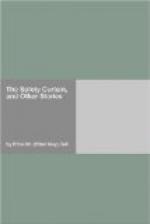To which he could make but the one reply, pressing her to his heart and kissing the red lips that mocked so merrily when the world was looking on.
She had become the hub of his existence, and day by day he watched her anxiously, grasping his happiness with a feeling that it was too great to last.
The rains set in in earnest, and the reek of the Plains rose like an evil miasma to the turbid heavens. The atmosphere was as the interior of a steaming cauldron. Great toadstools spread like a loathsome disease over the compound. Fever was rife in the camp. Mosquitoes buzzed incessantly everywhere, and rats began to take refuge in the bungalow. Puck was privately terrified at rats, but she smothered her terror in her husband’s presence and maintained a smiling front. They laid down poison for the rats, who died horribly in inaccessible places, making her wonder if they were not almost preferable alive. And then one night she discovered a small snake coiled in a corner of her bedroom.
She fled to Merryon in horror, and he and the khitmutgar slew the creature. But Puck’s nerves were on edge from that day forward. She went through agonies of cold fear whenever she was left alone, and she feverishly encouraged the subalterns to visit her during her husband’s absence on duty.
He raised no objection till he one day returned unexpectedly to find her dancing a hornpipe for the benefit of a small, admiring crowd to whom she had been administering tea.
She sprang like a child to meet him at his entrance, declaring the entertainment at an end; and the crowd soon melted away.
Then, somewhat grimly, Merryon took his wife to task.
She sat on the arm of his chair with her arms round his neck, swinging one leg while she listened. She was very docile, punctuating his remarks with soft kisses dropped inconsequently on the top of his head. When he ended, she slipped cosily down upon his knee and promised to be good.
It was not a very serious promise, and it was plainly proffered in a spirit of propitiation. Merryon pursued the matter no further, but he was vaguely dissatisfied. He had a feeling that she regarded his objections as the outcome of eccentric prudishness, or at the best an unreasonable fit of jealousy. She smoothed him down as though he had been a spoilt child, her own attitude supremely unabashed; and though he could not be angry with her, an uneasy sense of doubt pressed upon him. Utterly his own as he knew her to be, yet dimly, intangibly, he began to wonder what her outlook on life could be, how she regarded the tie that bound them. It was impossible to reason seriously with her. She floated out of his reach at the first touch.
So that curious honeymoon of theirs continued, love and passion crudely mingled, union without knowledge, flaming worship and blind possession.
“You are happy?” Merryon asked her once.




